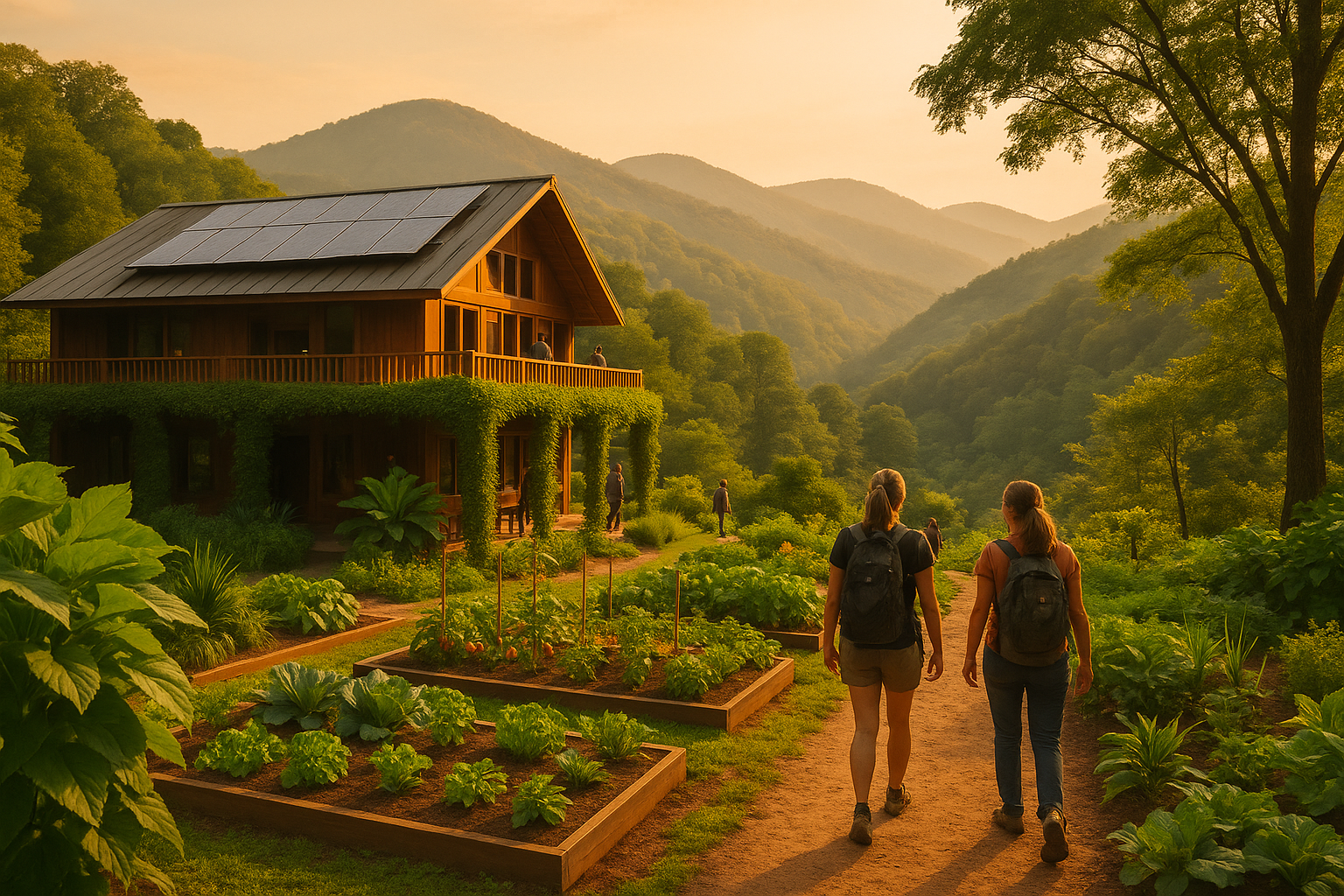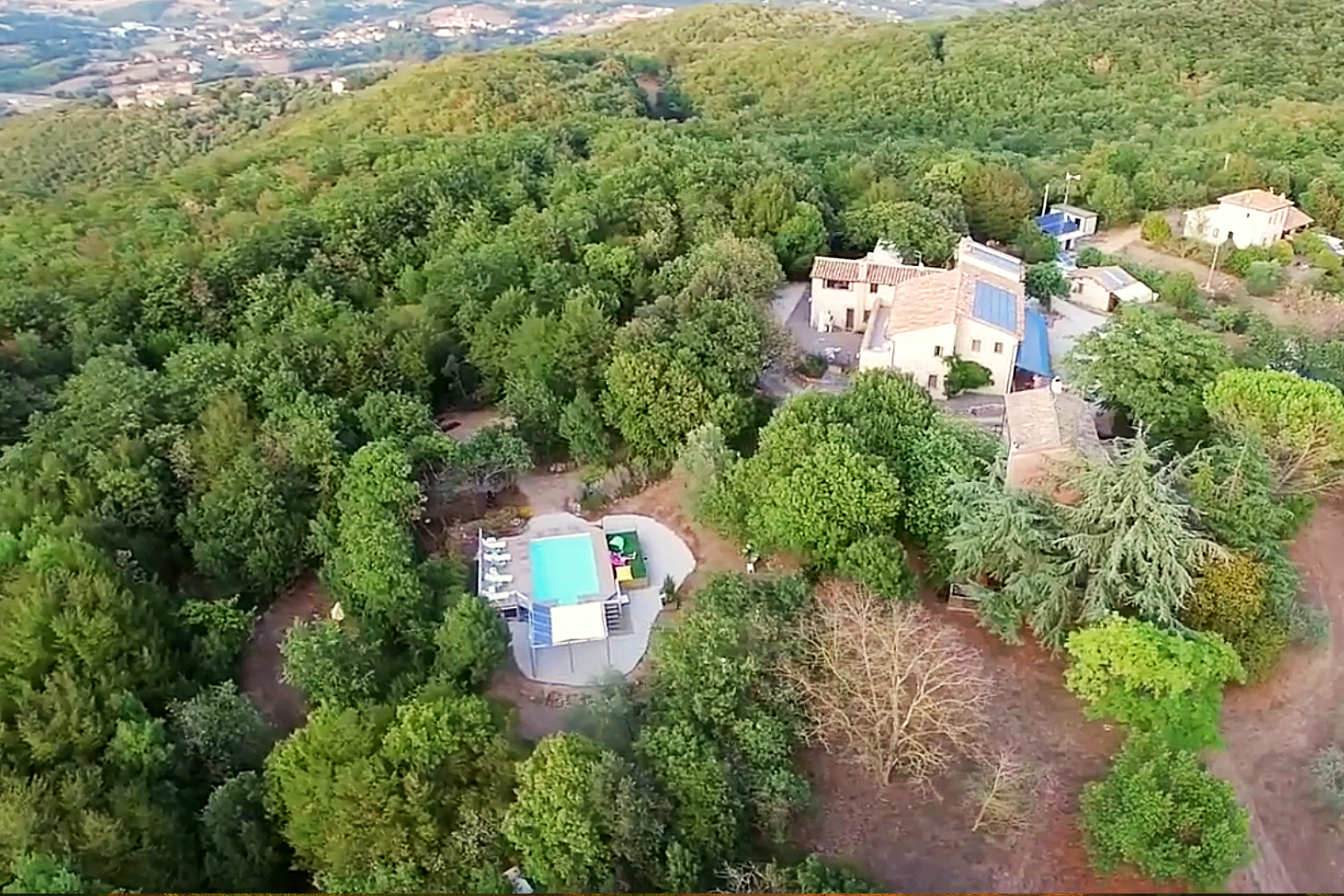
Re imagining Asheville’s Tourism with Eco Hotels
Asheville is a bustling hub of tourism. Many of these travelers come to Asheville seeking unique artsy experiences immersed in nature. This is what makes Asheville the perfect place for Green, net-zero commercial building, especially when it comes to building unique hotel experiences.
These types of accommodations don’t only reduce environmental impact. They can also differentiate Asheville as a premier destination, create new revenue streams, support local communities, and deepen visitor engagement with the land and the people who live here.
To illustrate how this could look, lets examine PER – an eco hotel in Italy that can help us see what benefits green hotel architecture can offer in Asheville.
A Case Study
PER (Park of Renewable Energy) is an agritourism and rural hospitality initiative in Umbria centered on renewable energy, sustainability, ecological design based in the philosophy of regenerative land use. Its vision couples hospitality with ecological awareness, local engagement, and energy innovation. When they started the project, there was no electricity or running water at the site, which became an inspiration for creating green systems.

Parco dell’Energia Rinnovabile – an eco hotel in Italy from above.
Some features of PER
It positions itself not merely as a hotel or farm stay, but as a park of renewable energy, with attention to energy systems, ecological design, and integration with the surrounding ecosystem. Visitors can see how the solar panels and eco systems integrate with the functioning of the hotel. The rooms are built with minimal impact on the environment, and to use minimal energy. The project aims to host guests in an environment that educates and immerses them in sustainability, while also collaborating with local communities, artisans, and farmers.
The model is part hospitality, part demonstration site, and part community hub. Visitors can engage more deeply with sustainable practices rather than being passive consumers. They get to experience an eco pool as a tourist, and also learn that it was built without cement or electrical connections with a water recycling system.
PER also grows vegetables, raises bees, and has a slow food kitchen to serve guests. This gives tourists a multifaceted immersion into living in harmony with nature.
Guests also get to interact with the staff in a different way than at a typical hotel. They get to create meaningful connections, and often become loyal repeat visitors.
PER and similar ecotourism ventures are increasingly recognized in the eco-travel niche and agritourism directories. Their success suggests that well-designed eco hotels can attract a discerning subset of tourists who look for meaningful experiences – which happens to be just the kind of people Asheville draws in.
Why Asheville Is a Strong Candidate for Eco Hotels
Existing Environmental & Permaculture Activity
In Western North Carolina, there are already pockets of permaculture interest, sustainable farming, Ecovillages, regenerative agriculture, and intentional communities.
- Earthaven Ecovillage, located roughly 45 minutes East from Asheville, is an existing community that practices permaculture, natural building, renewable energy, and ecological systems. They draw in tourists from around the world, eager to learn about living in harmony with the land.
- No Taste Like Home is another popular green tourism company. They teach wild edible foods in the blue ridge mountains. No Taste like Home brings in tourists eager to learn about sustainable living. Featured in Vogue and National Geographic, they bring in tourists from all over the world. They even have a subset on their website, linking their guests to nearby hotels – which illustrates green demand from this type of traveler.
Natural Attractions & Outdoor Appeal
Asheville and the surrounding Blue Ridge Mountains already draw visitors for national parks, forest trails, scenic drives, waterfalls, and outdoor recreation. These visitors often have an affinity for nature, which makes them natural potential customers for accommodations that deepen their connection to the land rather than just providing a place to sleep.
Differentiation
Asheville already has a strong brand in the arts, craft breweries, wellness, and mountain scenery. But many of its conventional hotels and resorts are not strongly differentiated in sustainability, or unique in the experience they offer. Introducing genuine regenerative lodging could help Asheville stand out in a region not yet saturated with top-tier ecotourism accommodations.
How Eco Hotels Could Benefit Asheville Tourism
Eco hotels can create multiple fold benefits: they can source food locally, hire local staff, host permaculture & ecology events, partner with local farmers, and weave themselves into the regional economy in a more symbiotic way than conventional lodging.
Eco hotels attract a niche market of conscious travelers. Guests who care about climate, sustainability, regenerative travel, and experiential learning specifically seek unique stays like eco-lodging. Asheville could capture a segment of travelers who might otherwise go to well-established green destinations overseas.
Additionally, eco hotels often lengthen stays and increase spending. They can offer immersive programming such as tours, workshops, farm-to-table meals, nature trails and more. Guests will be inclined longer and engage more deeply, translating to greater per-visitor spending on things like meals, experiences, and merchandise.
Brand Value and Reputation also creates a draw. By building Eco hotels, Asheville could become known not only for arts, craft beer, and mountains, but also for being a regenerative tourism destination, boosting its prestige while drawing press, and aligning with sustainability trends in travel.
Reduced Environmental Footprint & Resilience is another great factor. By incorporating renewable energy, water recycling, regenerative landscaping, natural building techniques, and low-impact operations, eco hotels can reduce carbon emissions, manage stormwater, preserve biodiversity, and serve as resilience nodes in times of climate stress.

Imagine
In the beautiful rolling hills of the Blue Ridge Mountains, a cosy permaculture retreat is nestled amongst permaculture gardens. Organic fruits and vegetables grown on site are used in the kitchen to create delicious healthy meals.Solar panels harvest the energy needed to heat and power the hotel. Out in the orchards leading up to the entrance, a class of schoolchildren learn about caring for fruit trees. Groups of tourists hike into the woods with guides, foraging for wild herbs and mushrooms.
Asheville has an opportunity to pioneer green tourism, and to create a healthy beautiful future.


